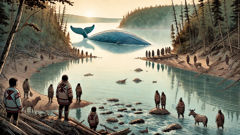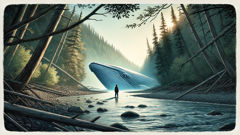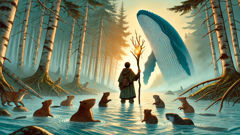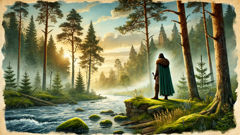Introduction
Long before the first city rose along the shores of the great rivers, and before explorers charted the vast forests of Eastern Canada, the world existed in balance, shaped by the wisdom of the land and its people. Among the Mi'kmaq and other First Nations, stories passed from one generation to the next, telling of legendary beings who walked between the realms of spirit and earth. Of all these heroes, Glooscap stands as one of the most revered—a giant in strength and understanding, a teacher, guide, and protector of his people and the natural world. The rivers ran clear then, teeming with salmon and shimmering with the reflections of towering pines and birches. The forests whispered with ancient secrets, and every creature, from the smallest mouse to the mightiest moose, had its place in the harmony of creation. But harmony can be fragile, disrupted by pride or selfishness, and it’s in these moments that Glooscap’s wisdom was most needed. This is the story of how Glooscap, through courage, patience, and compassion, restored the flow of life to a river blocked by the stubborn will of a great whale. It’s a legend born from the deep relationship between people and nature—a lesson about generosity, balance, and the invisible threads connecting all living things. With every retelling, this legend still speaks to the heart, reminding us that wisdom doesn’t always come from power alone, but from kindness, understanding, and the courage to set things right.
The Stillness and the Sorrow
In the early days, when the world was young and spirits walked freely among men and animals, the people lived by a great river winding through the heart of their ancestral lands. For generations, the river was their lifeblood: it gave fish for food, water for drinking, and a path for canoes gliding beneath leafy branches. The river’s song lulled children to sleep, its currents told stories, and its banks provided everything a village needed.

But one spring, when the ice melted and the land awoke, something changed. The river’s music faded to silence. No fish came up from the sea, and the water, once swift and clear, grew stagnant and dark. Where children once played, only anxious whispers remained. Hunters returned from the shore empty-handed. The elders watched the slow drift of leaves on unmoving water and felt the weight of sorrow settle over their homes.
Word of the river’s strange stillness spread. Some said it was the work of angry spirits. Others wondered if the people had forgotten to give thanks for the gifts of nature. But Glooscap, who traveled among the villages, listened carefully—not just to words, but to the land itself. He saw the withering reeds, the hungry otters, the eagles circling without prey. He sat by the water’s edge, his heart heavy for all living things.
One evening, as the sun dipped behind the trees, Glooscap gathered the elders, hunters, and children in the great clearing. His voice was deep and gentle, carrying like wind through pine needles. “We are all connected,” he said. “The sorrow of the river is our sorrow. The silence speaks of an imbalance—a lesson waiting to be learned.”
That night, Glooscap slept beneath the stars, listening to their silent wisdom. In a dream, the spirit of the river appeared to him as a shimmering woman cloaked in blue light. Her eyes brimmed with tears.
“My path is blocked,” she whispered. “My children—the salmon, the beaver, the otter—cannot pass. The people suffer because I cannot flow as I once did.”
“Who blocks your way?” Glooscap asked, his voice filled with concern.
“A great whale,” she replied. “He rests where the river narrows, refusing to move. His pride has turned to stubbornness. He believes the river belongs to him alone.”
Glooscap awoke at dawn, resolved to find the truth and restore the harmony that once blessed the land. He prepared for his journey, gathering a staff carved from ancient birch, a pouch of sacred tobacco, and gifts for the spirits he might meet along the way. With quiet determination, he set off, following the river’s silent course into the heart of the forest.
Journey to the Whale’s Domain
The river wound deeper into the forest, narrowing as it passed under arches of spruce and cedar. Glooscap walked in silence, his senses open to every rustle and sigh. He saw where beavers had abandoned their lodges, where otter slides lay dry, and where herons paced along empty shallows.

As he traveled, Glooscap met creatures troubled by the river’s stillness. A family of beavers approached him, teeth chattering with worry. “Great Glooscap,” they begged, “we cannot build our dams, for the water does not run. Will you help us?”
Glooscap knelt and placed a reassuring hand on their soft brown heads. “I promise,” he said. “The river will flow again.”
Further on, a wise old turtle stopped him at a bend. The turtle’s shell was painted with the history of the river: salmon leaping, eagles soaring, children playing. “All things have their place,” the turtle intoned. “But pride can cloud the mind. The whale forgets he is but one part of a greater whole.”
Glooscap nodded thoughtfully, carrying these words in his heart. When at last he reached the river’s narrowest point, he saw the truth of the river spirit’s warning. There, sprawled across the channel, was the great whale—his body a mountain of shimmering gray, his head resting on one bank and his massive tail on the other. The whale’s dark eye watched Glooscap with suspicion.
“Who comes to disturb my rest?” the whale rumbled, his voice deep as thunder beneath the waves.
“I am Glooscap,” came the reply, calm and strong. “Why do you block the river, bringing sorrow to all who live along its banks?”
The whale raised his head slightly, water streaming from his broad brow. “I am lord of this river. It is mine alone. I have traveled from the endless ocean and found peace here. The river is cool and sweet; I will not leave.”
“But the river is not yours alone,” Glooscap said gently. “It belongs to the fish, the otter, the beaver—to the people and to all living things.”
The whale snorted, sending up a spray that sparkled in the sunlight. “They can find another place. Here, I am king.”
Glooscap studied the whale—his size, his pride, his loneliness. “Do you not miss your family in the sea? The freedom of open water?”
The whale’s eye flickered with a trace of sadness, but he quickly looked away. “They did not understand me. I am happier here.”
Glooscap realized then that the whale’s stubbornness was rooted in loneliness as much as pride. He sat on a smooth stone and began to sing—a song of flowing rivers, of distant seas, and of kin waiting across the waves. The melody drifted over water and forest, stirring even the leaves in the high branches.
The whale listened, his heart aching with memories of home. Yet still he refused to move. “My place is here now,” he said, though his voice trembled.
Glooscap sighed. He knew this would not be easy. Rising to his full height, he spoke with both firmness and compassion. “If you remain, all who depend on the river will suffer. Your happiness cannot come at the cost of so many others.”
The whale turned away, curling his tail in defiance. Glooscap gazed at him for a long moment, then stood and walked back into the forest, resolved to seek another path.
Wisdom and Trial by Water
Back among the trees, Glooscap sat beside a mossy log, pondering what he had learned. He called upon the spirits for guidance, sending curls of sacred tobacco smoke skyward. As the smoke rose, the animals gathered—beaver, otter, heron, even the shy lynx—drawn by the hope that Glooscap could restore what was lost.

A gentle wind stirred the leaves, carrying the voices of elders past. "Teach through wisdom, not force," they seemed to whisper. Glooscap nodded. He would not harm the whale, for every creature had its place. But he would not let one’s selfishness destroy the balance of the world.
He returned to the river and called to the whale again. “Let us make a bargain,” he offered. “If you are truly master of this river, prove it. Show your strength not by blocking others, but by shaping the river’s course for the good of all.”
The whale was curious despite himself. “How?”
“We will have a contest,” Glooscap said. “If you can make the river flow as it once did—swift and clear—I will declare you its true master. But if you cannot, you must promise to leave and return to your family in the sea.”
The whale agreed, pride gleaming in his eye. With a mighty heave, he thrashed his tail and tried to force the water forward, but his bulk only churned up mud and tangled reeds. The river became even more muddled. Birds cried out as fish fled in panic.
Glooscap watched patiently, then rose and lifted his birch staff. He dipped it into the water and sang an ancient song of healing and release. The staff glowed with spirit light. Where it touched, the river cleared; water swirled around obstacles, carving new channels with gentle persistence. Fish darted forward, otters rolled and played, and reeds stood tall once more.
The whale watched in awe as Glooscap’s wisdom shaped the river’s return. “Strength is not enough,” Glooscap said softly. “True power lies in understanding and harmony. Will you learn this lesson?”
The whale hung his great head in shame, finally seeing the harm he’d caused. “I am sorry,” he whispered. “I was lonely and forgot the needs of others.”
Glooscap placed a gentle hand on the whale’s brow. “You are not alone, brother of the deep. Go back to your family. The river will always welcome your song—but never at the cost of its own life.”
With a mighty push, the whale turned and slid back toward the sea. The water rushed after him in waves of joy, carrying fish and laughter and life. The river spirit rose from the depths, smiling through tears of gratitude. The people rejoiced as their canoes skimmed once more over clear, running water. Balance was restored, and the lesson of wisdom remained, carried by every ripple and breeze.
Conclusion
From that day forward, the river sang once more, its voice strong and joyful as it wound through forests and villages. Salmon returned in silvery throngs; beavers built sturdy lodges; children laughed and played along sparkling banks. And every spring, when the mist rose from the water at dawn, people would remember Glooscap’s wisdom—the lesson that true strength lies in compassion and balance. The story passed from elder to child, weaving its way into baskets and songs, teaching each new generation that every creature has a place, but none should block the flow of life for others. In honoring this wisdom, the people thrived, and harmony remained between land, water, and all who called it home.













